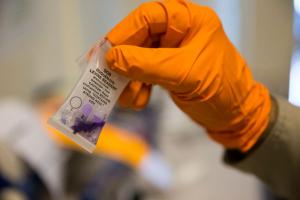South Korea's policy of strict abstinence from drugs takes a toll.
The Hawaii attorney general's office opposes marijuana legalization but sees the writing on the wall.
A Ukrainian rightist faction is blocking the signing of the just-passed medical marijuana bill, the Biden administration moves to expand access to naloxone at federal facilities, and more.
There is yet another hiccup in the effort to get Alabama medical marijuana dispensaries open, South Dakota's Republican governor commutes the prison sentences of a dozen people for using drugs, and more.
Somebody in Washington state thinks people who smoke pot should not be hired in drug treatment positions, Iran hangs nine more people for drug convictions, and more.
A New York bill takes aim at unlicensed pot shops, the Honolulu city council approves an ordinance requiring that naloxone be on hand at bars and nightclubs, and more.
A Florida Republican lawmaker files a bill to cap THC limits in legal weed if voters approve an initiative, the new Thai government attempts to rein in recreational marijuana sales and use, and more.
A new NORML report looks at marijuana expungements, a Kentucky bill that would legalize pot possession and home grows but not commercial sales is filed, and more.
A Rhode Island bill would temporarily legalize the possession, cultivation, and sharing -- but not the commercialization -- of psilocybin, a California bill is the first in the nation to target roadside field drug tests and more.
The US is set to send assistance ot Ecuador as it battles rampaging drug gangs, a medical marijuana expansion bill gets filed in Delaware, and more.
A bill requiring warnings that medical marijuana users cannot own guns is moving in South Dakota, a pair of Alaska lawmakers file a psychedelic reform bill, and more.
The Department of Health and Human Services releases its full review of marijuana rescheduling, Oregon GOP lawmakers plot to undo drug decriminalization there, and more.
Noted South Korean actor Lee Sun-kyun, best known for his role in the 2018 Oscar-winning thriller/satire "Parasite," has become the most well-known victim of his government's fanatical war on drugs. On December 27, Lee, 48, was found unconscious in a car filled with carbon monoxide weeks after he was named as a suspected drug user. He died shortly later, leaving behind a suicide note.

Lee Sun-Kyun in happier times. (Kinocine/Creative Commons)
Lee came to the attention of authorities after allegations that he used drugs, including marijuana and ketamine, with a night club hostess. Lee claimed that the allegations were part of a
blackmail plot aimed at him and publicly apologized for "causing immense disappointment" and said he was "sorry for my family, who are enduring extreme pain at this moment."
He nonetheless underwent at least three separate police interrogations, including one lasting 19 hours just days before his death. He also suffered professional consequences after coming under suspicion, being dropped from a film in October after the allegations against him went public.
Lee found himself wrapped up in conservative President Yoon Suk Yeol's crusade against drug use after Yoon promised last spring that his government would "join all forces to win the war on drugs," following another pair of sensational drug arrests. He launched a new drug investigation department at the Supreme Prosecutors Office and staffed it with 840 people.
"Harsh investigations are necessary to punish drug criminals," Yoon said. "Efforts should also be given to rehabilitation treatment to help them return to society at the earliest possible date," he added.
Those hundreds of new drug cops have made a difference. Police arrested more than 17,000 people on drug charges in the first 11 months of 2023, a whopping 39 percent increase over the same period in 2022 -- and 2022 was a record year for drug arrests. More than a thousand arrested were teenagers, a 300 percent increase over previous years.
The current antidrug campaign is a deepening of the "war on drugs" Yoon declared upon coming to office in 2022 as he warned that drugs were becoming more accessible nationwide. And it extends beyond the state, with celebrities leading "just say no" campaigns on social media and talk shows devoting entire episodes to antidrug programming.
It has engulfed other celebrities beyond Lee. Former K-pop boy band singer G-Dragon was under weeks-long investigation for public drug use until police dropped the case last month after he came up negative on repeated drug tests. Still, his image no longer adorns BMW Korea online ads. And actor Yoo Ah-in, star of the 2018 film "Burning" and the 2021 Netflix series "Hellbound," faces trial after testing positive for propofol, marijuana, ketamine, and cocaine. He has already been cut from the second season of "Hellbound" and has lost advertising work with several South Korean retailers.
This has all been fodder for sensationalist media, and that coverage could have contributed to Lee's death in a country that holds the highest suicide rate among developed nations, said Kang Youn-gon, a media communication professor at Seoul's Chung-Ang University.
"Lee faced some allegations but they haven't been formally verified. But the media has been assertively reporting about Lee's private life… and I think that's something wrong," Kang said.
Lee's lawyer, Seongcheol Park, accused the police of violating rules about the public release of information, adding that Lee had tested negative in multiple drug tests and that police did not take his blackmail claim seriously.
"The process was insulting and humiliating to him, even though there was no evidence that he had taken drugs, Park said. "While it's true that drug investigations are necessary, it's a problem when they go too far and don't follow procedures and protocols."
Drug use or possession can garner a penalty of six months to four years in prison, while dealing or trafficking can lead to a sentence of up to 14 years. South Korean officials say that a tough approach is necessary to keep drug use under control, but they have plenty of critics.
"When you look at data and you look at the harsh penalties that have been in place for decades now, they haven't worked," said Gloria Lai, a regional director for the International Drug Policy Consortium, an organization that promotes evidence-based drug policies around the world. "And the cost on people's lives is huge."
"Cracking down with these harsh punishments and unreasonably long years of imprisonment is not going to be effective" in reducing drug use and overdose deaths, said Hyeouk Chris Hahm, a professor at the Boston University School of Social Work. "And we know that from the history of the US."
back to top
Hawaii Attorney General Anne Lopez last Friday sent a 315-page draft marijuana legalization bill to legislative leaders, along with a 38-page report detailing her office's concerns with what it sees as an undesirable but unstoppable move. The draft bill signals Lopez' grudging acceptance that legalization is coming and her effort to make sure it does not inflict what she sees as potential damage to health and public safety.

Is legal weed about to come to the Aloha State?
The Senate last year
approved a marijuana legalization bill with only three dissenting votes, although it failed to advance in the House. The state already has a small medical marijuana industry, with eight dispensaries operating on four islands.
"The Department of the Attorney General (Department) has provided a formal report to key legislators emphasizing the department's legal concerns and the significant risks to public safety and public health that could arise if the legislature legalized adult-use cannabis," her office announced. "Also included was draft legislation intended to minimize these risks and promote the public welfare to the greatest extent possible, should the legislature choose to legalize cannabis.
"Despite the substantial work put into the final draft bill, the department does not support the passage of the legalization of adult-use cannabis," the report continued. "But the department will not oppose the passage of a bill and will remain neutral on the question of its passage, so long as the bill contains the key elements identified in this section and does not include provisions antithetical to these elements, as it may be amended through the legislative process."
"The Department of the Attorney General does not support the legalization of adult-use cannabis," reiterated Attorney General Lopez. "We acknowledge that with changing public perception in recent years, the odds that the legislature may pass legislation legalizing adult-use cannabis have increased substantially. Given that the legislature could theoretically pass a bill as early as this year, it is my department's duty to warn the legislature of the risks, while simultaneously providing a framework that includes robust public-safety and public-health safeguards."
"The draft bill is not 'the Department of the Attorney General's cannabis bill," Lopez continued. "The draft bill was prepared to give the legislature a legislative option to consider -- a draft with public safety and public health protections embedded into its structure. Should the legislature decide to legalize adult use cannabis, the draft bill represents our best judgment about how to promote a legal market, minimize risks of societal harm, mitigate damage that does come to pass, avoid liability, and provide workable tools and substantial resources for law enforcement and public-health officials to promote the public welfare."
The bill envisions a taxed and regulated commercial market, as well as allowing for the home cultivation of up to six plants -- 10 plants for medical marijuana patients.
The attorney general's draft bill is arranged along six pillars:
- The enacting of the Hawai'i Cannabis Law, which is a legal safe harbor from state criminal prosecution concerning activities relating to cannabis for those who strictly comply with its provisions;
- The creation of an independent body -- the Hawai'i Cannabis Authority -- with the power to regulate all aspects of the cannabis plant (whether medical cannabis, adult-use cannabis, or hemp) in accordance with the Hawai?i Cannabis Law;
- The continuing role of law enforcement agencies in addressing illegal cannabis operations not acting in accordance with the Hawai?i Cannabis Law, which pose threats to public order, public health, and those business operators who choose to operate in the legal market;
- A vibrant, well-funded social equity program to be implemented by the Authority with the intent to bring greater economic opportunity to disadvantaged regions of our state and to help transition formerly illicit operators into the legal market;
- A delayed effective date of 18 months for the legalization of adult-use cannabis and the first legal retail sales to allow the Authority, law enforcement, licensees, and the public to prepare; and
- The implementation of extensive, well-funded public health protections, including public education campaigns about the new laws and the continuing risks to public health -- especially to children -- posed by cannabis, and financial assistance for public health services such as addiction and substance abuse treatment. The report further provides guidance to the Legislature regarding amendments that would be considered unacceptable to the department.
Now, the legislature can take this draft and work its magic with it.
back to top
A Ukrainian rightist faction is blocking the signing of the just-passed medical marijuana bill, the Biden administration moves to expand access to naloxone at federal facilities, and more.

Biden grants more pardons and clemencies. (whitehouse.gov)
Arizona Officials Will No Longer Pursue Most Cases Involving Prenatal Marijuana Exposure. The Department of Child Safety has announced that it will no longer take punitive action against women who consume marijuana during their pregnancies. The decision comes nearly a year after the state Supreme Court upheld a lower court decision finding that doctor-approved medical marijuana use by pregnant women is not child neglect under state law.
The department has since acknowledged that it does not have the legal authority to investigate cases involving prenatal marijuana exposure unless there are explicit allegations of child neglect.
The new policy will take effect in January.
Harm Reduction
Biden Administration Takes Action to Increase Naloxone Access at Federal Facilities. On Thursday, the Department of Health and Human Services (HHS) and the General Services Administration (GSA) announced new guidance recommending that all federal facilities across the nation include overdose reversal medications in their safety stations on site. The recommendation will make lifesaving medications like naloxone more readily available in case of an emergency situation.
"Far too many lives are being lost to overdose. Fortunately, we know what it takes to save people. Safety stations save lives," said HHS Secretary Xavier Becerra. "We must continue to do everything we can to make sure the necessary tools are quickly and easily available so anyone can respond to an emergency situation -- anytime, anywhere. It's about empowering everyone to play a role in saving lives when it counts the most."
"Saving lives is at the very core of the HHS Overdose Prevention Strategy and that's why it's so important for federal facilities to have naloxone and other opioid overdose reversal medications readily available," said Miriam E. Delphin-Rittmon, Ph.D., HHS Assistant Secretary for Mental Health and Substance Use and the leader of SAMHSA. "Taking this step ensures these lifesaving medications are accessible, and protects the millions of Americans that work in and visit these facilities every year."
The updated guidelines expand the concept of an automated external defibrillators (AED) program by introducing the "safety station," which would enable anyone located within a federal facility to access the necessary tools quickly and easily to respond to an emergency situation. Under the new guidance, anywhere that an AED was previously located can and should be converted to a safety station. Each safety station is recommended to include an AED and supporting equipment at a minimum. It is now highly recommended that each station also includes either a bystander-empowered opioid reversal agent or hemorrhagic control component, or both.
Pardons and Commutations
Biden Pardons Thousands of Federal Marijuana Offenders, Commutes Sentences for 11 Drug Offenders. President Biden on Friday pardoned thousands of Americans who had been convicted of using or possessing marijuana on a variety of federal lands. He also commute the sentences of eleven people convicted of nonviolent drug offenses.
The marijuana pardons apply to federal lands including national parks and forests wildlife refuges, and even the CIA grounds. They apply only to US citizens and only to small-time pot possession. People charged with marijuana distribution or driving under the influence are not covered.
The eleven clemency recipients were serving decades-long or even life sentences but would have been sentenced to less time under recent sentencing reforms. Some of them were serving sentences for crack offenses.
"Too many lives have been upended because of our failed approach to marijuana. It's time that we right these wrongs," the president said in a statement. "Just as no one should be in a federal prison solely due to the use or possession of marijuana, no one should be in a local jail or state prison for that reason, either."
Biden also pardoned thousands of federal marijuana possession convictions in 2022, and at the end of last year, he pardoned six Americans with drug-related charges.
International
Ukrainian Rightist Parliamentary Faction Blocks Signing of Medical Marijuana Bill. The Ukrainiana parliament, the Verkhova Rada, approved medical marijuana on Thursday, but on Friday, the rightist Batkivshchyna (Fatherland) parliamentary faction blocked the signing of the bill.
The bill will remain blocked until at least mid-January, when the parliament could move to unblock and let it be signed into law by President Volodymyr Zelensky.
Batkivshchyna leader Yulia Timoshenko has consistently opposed the legalization of medical marijuana and has charged that the bill "legalizes drug trafficking and the drug mafia in the country," without providing evidence to support her accusations.
She also said that her party intends to ask the Constitutional Courts to annul the results of the vote because "the amendments to the bill were considered in a half-empty chamber."
back to top
There is yet another hiccup in the effort to get Alabama medical marijuana dispensaries open, South Dakota's Republican governor commutes the prison sentences of a dozen people for using drugs, and more.

South Dakota Gov. Kristi Noem has commuted the sentences of a dozen people imprisoned for "unlawful ingestion" of drugs. (CC)
UFC Knocks Out Marijuana Ban: Major Shift in Professional Athlete Drug Policy.The Ultimate Fighting Championship (UFC) has announced that it has removed marijuana from its list of banned substances for professional fighters, building on a 2021 policy that largely protected its athletes from being penalized for testing positive for THC.
"UFC's goal for the Anti-Doping Policy is to be the best, most effective, and most progressive anti-doping program in all of professional sports," said UFC chief business officer Hunter Campbell.
With this move, the UFC is part of a broader trend in sports organizations of relaxing their marijuana policies. The National College Athletic Association (NCAA), National Basketball Association (NBA), and Major League Baseball (MLB) have all made similar adjustments, while the National Football League (NFL) modified its testing policy in 2020.
Medical Marijuana
Alabama Judge Temporarily Blocks Issuance of Medical Marijuana Business Licenses. Montgomery Circuit Judge James Anderson last week issued a temporary restraining order that blocks the state from issuing new licenses to medical marijuana dispensaries. The move comes amid an ongoing legal dispute over how the state selected the winning companies.
The Alabama Medical Cannabis Commission had awarded licenses to four dispensaries, but they will be on hold while Judge Anderson hears the challenge to the selection process.
State lawmakers approved medical marijuana in 2021, but a series of delays -- of which this challenge is merely the latest -- have prevented the opening of dispensaries so far. The commission says it is aiming to get them open this year.
The commission has issued licenses to other companies that were selected to cultivate, transport, and test marijuana and is set next month to issue the coveted "integrated" licenses for vertically integrated companies that grow, transport and sell medical marijuana. Anderson has not yet ruled on a request to block the issuance of the integrated licenses.
The case against the dispensary licensing was brought by Yellowhammer Medical Dispensaries, which had initially been awarded a license but saw that license rescinded amid disputes about the election process and was not selected as a licensee in the final round.
Pardons and Commutations
South Dakota Frees A Dozen People Convicted of Drug Ingestion but Keeps Them on Parole. On the Friday before Christmas, Gov. Kristi Noem (R) commuted the prison sentences of a dozen people imprisoned under the state's harsh and unique "ingestion" law, which requires only a positive drug test to hand someone a felony conviction and a prison sentence. But instead of freeing them entirely from the state's clutch, she ordered that they be placed on community supervision for their unauthorized possession of a controlled substance convictions.
No other state has or applies a law that criminalizes people just for drug use. And South Dakota does apply it. In 2022, nearly one out of five non-violent female prisoners were doing time on ingestion charges, and so were 12% of non-violent male prisoners.
Last year at this time, Noem issued seven commutations, including some for people convicted of violent crimes and some that went against the wishes of victims' families and the state parole board. One of the recipients of Noem's 2022 commutations pleaded guilty to another crime less than two weeks after her release. The 12 commutations this year bring her total since taking office in 2019 to 24.
International
British Columbia Supreme Court Blocks New Law Against Public Drug Use. The Canadian province is in the second year of a three-year experiment with drug decriminalization, which allows adults to possess up to 2.5 grams of drugs such as heroin, fentanyl, cocaine, and methamphetamine, but the provincial legislature in November passed a law criminalizing drug use in places frequented by children and families. Now, the provincial Supreme Court has stepped in to block that move -- at least temporarily.
The court last Friday issued a temporary injunction until March 31to halt enforcement of the law, saying "irreparable harm will be caused" if the law comes into force.
The Restricting Public Consumption of Illegal Substances allows fines and imprisonment for people who refuse to comply with police orders not to consume drugs within six meters (20 feet) of all building entrances and bus stops; within 15 meters (49 feet) of playgrounds, spray and wading pools, and skate parks; and in parks, beaches and sports fields.
The law was challenged by the Harm Reduction Nurses Association, which argued it would violate the Canadian charter if enforced. Attorneys for the association announced themselves pleased with the ruling, saying it shows "substance use cannot be legislated without scrutiny."
Provincial officials were not so pleased. "The law in question prevents the use of drugs in places that are frequented by children and families," said BC Solicitor General and Public Safety Minister Mike Farnworth. "While we respect the decision of the court, we are concerned that this decision temporarily prevents the province from regulating where hard drugs are used, something every other province does, every day."
back to top
Somebody in Washington state thinks people who smoke pot should not be hired in drug treatment positions, Iran hangs nine more drug offenders, and more.

Iran executed nine drug convicts in recent days, state media reports. (iranhr.net)
Washington Bill Would Roll Back New Marijuana-Related Employment Protections for Drug Treatment Professionals. Even as a new state shielding most marijuana-using job applicants from employment discrimination goes into effect this week, a bipartisan pair of lawmakers have pre-filed a bill that would roll back that protection for drug treatment workers.
House Bill 2047, sponsored by Reps. Tom Dent (R) and Lauren Davis (D), takes the list of positions exempted from the new law -- including law enforcement, jobs requiring a federal background investigation or security clearance, fire departments, first responders, safety-sensitive positions, corrections officers and those in the airline or aerospace industries -- and adds drug treatment workers to the list.
The bill would specifically allow employers to not hire people who test positive for weed for positions "as a substance use disorder professional or trainee, or any position as a health care professional licensed or certified… where the person will be providing services directly to clients or patients receiving treatment for substance use disorder."
The bill does not require drug treatment industry employers to test for marijuana, but they would no longer be subject to the new law's provision making it "unlawful for an employer to discriminate against a person in the initial hiring for employment if the discrimination is based upon" the use of marijuana off the job and away from the workplace or a positive drug test for cannabis metabolites. The new law only applies to pre-employment drug testing and employers in general can still prohibit marijuana use by workers after they are hired.
Harm Reduction
AMA Publishes Overdose Epidemic Report 2023. The American Medical Association has published its Overdose Epidemic Report 2023, outlining actions that have been taken by physicians to help end the opioid overdose and death epidemic, as well as what still needs to be done.
The report notes that "the drug-related overdose epidemic is deadlier than ever," even as opioid prescriptions decreased for the 13th consecutive year. This is because overdose and death related to illicitly manufactured fentanyl, methamphetamine, and cocaine increased while xylazine and other toxic synthetic adulterants pose new challenges.
The AMA complained that while the AMA Substance Use and Pain Care Task Force continues to "advance evidence-based recommendations for policymakers and physicians" to help end the opioid epidemic, "positive strides are hindered by a lack of meaningful implementation and enforcement of policies that support affordable, accessible and evidence-backed care for patients with substance use disorders, pain or those needing harm reduction services like naloxone, syringes and fentanyl test strips."
It is "Black and Brown communities, pregnant individuals, and youth" who are disproportionately impacted and dying at increased rates compared to other population groups, the report found.
The report notes that doctors have greatly reduced opioid prescribing in almost all states and by nearly 50 percent nationally, but that has not led to fewer fatal drug overdoses "primarily due to illicitly manufactured fentanyl, fentanyl analogs, stimulants and other substances."
The report does not address the impact of reduced opioid prescribing on patients suffering from acute or chronic pain.
The report calls on all states to decriminalize drug checking supplies and to reform Good Samaritan laws to protect those who overdose or seek help for an overdose. It also calls for removing barriers to evidence-based care for patients with substance use disorders and to medications for opioid use disorders and treatment for substance use disorders and co-occurring mental illness in the jails and prisons throughout the country.
International
Iran State Media Reports Nine Drug Executions. The official IRNA news agency reported Wednesday that Iran has hanged nine convicted drug traffickers in recent days. Three were hanged at a prison in the northwestern province of Ardabil on charges of "buying and transporting heroin and opium," IRNA said, while the other six were hung separately on charges of trafficking "methamphetamine, heroin and cannabis," it added.
Iran had long been one of the world's leading drug executioners but changed its policies in 2017, resulting in a dramatic reduction in them. But executions for all reasons increased last year as the country's rulers grappled with boiling social unrest.
In June 2023, Amnesty International reported that Iranian authorities had executed at least 173 people convicted of drug-related offenses during the first five months of 2023, accounting for around two-thirds of all executions. In November 2023, the Iran Human Rights Group said the Islamic republic had executed more than 700 people overall last year, the highest figure since 2015.
Ukraine Lawmakers Send Medical Marijuana Bill to Zelensky's Desk. Overcoming a last-minute effort by conservative factions to derail the effort, lawmakers have given final approval to a bill legalizing the use of medical marijuana and sent it to the desk of President Volodymyr Zelensky's desk, who is expected to sign it into law shortly.
The bill allows medical marijuana for patients diagnosed with serious illnesses and PTSD linked to the ongoing war with Russia. While the bill only explicitly mentions cancer and PTSD, lawmakers heard repeatedly from people suffering from other ailments. The bill moves marijuana from a List I substance to a List II substance, meaning it is available for therapeutic use if prescribed.
The Ministry of Agrarian Policy will regulate cultivation, while the State Agency on Medications and the National Police will oversee distribution. The bill also allows for import of raw marijuana in a bid to ensure patient access.
back to top
A New York bill takes aim at unlicensed pot shops, the Honolulu city council approves an ordinance requiring that naloxone be on hand at bars and nightclubs, and more.

Honolulu. It is now the first American city to require that venues carry naloxone. (Creative Commons)
California Cannabis Café Bill Revived. The legislature last year approved a bill to allow Amsterdam-style cafes where people could consume marijuana, Assembly Bill 374, only to see it vetoed by Gov. Gavin Newsom (D). Now, bill sponsor Assemblymember Matt Haney (D-San Francisco) says he will bring it back again this year.
Californians can already smoke or otherwise consume marijuana on-site in licensed consumption lounges but marijuana shops cannot sell non-marijuana items, such as food and coffee. This bill would change that.
Currently, it's not illegal in California for customers to smoke or consume cannabis on-site in consumption lounges, but it is illegal for dispensaries to sell non-cannabis products, including food and coffee.
Haney's office stressed concerns about the state's huge black market, which the legal marijuana industry must contend with. Recent estimates put the size of the state's legal marijuana sales at $4 billion in 2020, while black market sales were estimated to be double that at $8 billion.
"It's really about fairness and supporting businesses that follow the rules. If we keep allowing unnecessary regulations to strangle California's legal cannabis businesses, we're just encouraging illegal drug sales and all of the problems that come with that," said Haney.
"To be clear, we're not saying that coffee shops should be allowed to sell cannabis," he added. "We're saying that cannabis shops should be allowed to sell coffee. It shouldn't be illegal for an existing cannabis business that already allows onsite smoking to move away from only selling marijuana and instead have the opportunity to grow and create jobs by offering coffee or live jazz."
New York Bill Takes Aim at Unlicensed Pot Shops. Assemblymember Jenifer Rajkumar (D) has filed the Stop Marijuana Over-proliferation and Keep Empty Operators of Unlicensed Transactions (SMOKEOUT) Act, which would give cities and towns new enforcement powers to shut down unlicensed pot shops, which have spread like mushrooms since the state legalized marijuana but lagged on getting legal shops open.
The bill would make selling unregulated marijuana products a Class A misdemeanor but does not specify any fines or jail time. It would also allow municipalities to not only shut down suspected illicit pot shops but also seize their merchandise and even the property itself. The power to close pot shops is currently held only by the state's Cannabis Control Board.
"The [bill] grants all municipalities across our Great State the authority to order the closure of unlicensed cannabis retailers and seize all merchandise, swiftly ending the blight of illegal smoke shops once and for all," a description for the legislation reads.
The bill's summary estimates the number of unlicensed pot shops in New York City alone at 1,500 and claims the stores are undermining the legal marketplace. It also says the illicit shops hold large quantities of illicit products and cash, making them targets for robberies, contending that there were more than 600 reported robberies of pot shops in 2022 and five fatal shootings at the shops last year.
Harm Reduction
New Hampshire House Approves Expanded Drug Checking Bill. On its first day back at work in the second year of a two-year session, the House on Wednesday approved House Bill 470, which would allow comprehensive drug checking to occur in the state. Last year, the legislature approved legalizing fentanyl and xylazine test strips.
The bill had been detained in the House Criminal Justice and Public Safety Committee last year, mainly because of concerns that drug traffickers would tke advantage of it, but a subcommittee worked through the summer and fall to craft amendments that would allow it to pass. It did that on a 12-8 vote. And on Wednesday, the full House followed suit, approving it on a vote of 212-161.
Sponsored by Rep. David Meuse (D-Portsmouth), the bill seeks to remove "drug-checking equipment" entirely from the state's definition of drug paraphernalia. It would also allow people to possess "nominal amounts" of drugs for the purpose of drug-checking -- without the fear of criminal prosecution.
"One of the reasons we need bills like this is we are not in a static situation when it comes to our epidemic of drug overdoses," Meuse said. "If we want to make an impact and we want to save lives, these are the sort of decisions we actually have to be prepared to make."<
The bill now heads to the Senate.
Honolulu Becomes First American City to Require Naloxone in Food and Drink Venues. The city council voted Monday to make Honolulu the first American city to require that bars, nightclubs, and restaurants keep the opioid overdose reversal drug naloxone on hand.
"Naloxone is a necessary tool these days in light of the national opioid epidemic," said Councilman Tyler Dos Santos-Tam. It should be available and accessible in as many places as possible, in the same way we have fire extinguishers and defibrillators in case of emergencies. "This new law will not only save lives, it will hopefully set an example for other cities throughout the United States," he added.
The drug is deployed using a nasal spray that can revive a person going through an opioid overdose. Hawaii has the sixth-lowest opioid death rate per capita of any state. This measure should help stay on the low end.
back to top
A Florida Republican lawmaker files a bill to cap THC limits in legal weed if voters approve an initiative, the new Thai government attempts to rein in recreational marijuana sales and use, and more.

Is medical marijuana finally coming to Wisconsin? (Creative Commons)
Florida GOP Lawmaker Files Bill to Cap THC Content if Voters Approve Marijuana Legalization. Rep. Ralph Massullo (R) has filed a bill that would cap the potency of recreational marijuana in the event it is approved by voters in November. The measure, House Bill 1269, would set a limit of 10 percent THC for smokeable marijuana products, a level far below what is generally available in most legal state markets.
The bill also caps THC at 60 percent in other forms of marijuana, such as extracts, and limits edibles to 200 milligrams of THC, with individual servings containing no more than 10 milligrams.
Most states with legal markets see marijuana flowers at between 20 and 30 percent THC, and that is the case in Florida's medical market as well. Massullo's bill only applies "potency limits for adult personal use," meaning that if it and the legalization initiative both passed, Floridians with medical marijuana cards could buy full-potency marijuana, but recreational users could not.
Hawaii Attorney General Releases Formal Report on Marijuana Legalization Concerns. The state attorney general's office on Friday released a report detailing its concerns as the state moves toward marijuana legalization. The office said it has two main concerns about legalization, centered on public safety and health.
The Department of the Attorney General stressed it does not support the legalization of cannabis. The Department said if legalized it has two main concerns regarding public safety and health.
"It has been commonly said in the past is that cannabis is a harmless drug. Every health professional that we've spoken to on the subject says that's not the case, particularly with respect to children and the way their brains develop," said Dave Day, the special assistant to the attorney general. "One of the things that we've seen in other states that have legalized cannabis is the increased prevalence of driving while high or impaired driving. That's something that is a difficult thing to address."
The attorney general's office also released a draft bill for marijuana legalization, with provisions including a robust regulatory agency that would investigate and enforce those who are not acting within the confines of the law and creating consequences for drivers to face if they're caught driving high.
The Report Regarding the Final Draft Bill Entitled "Relating to Cannabis" can be found here. The draft bill can be found here.
Medical Marijuana
Wisconsin GOP Assembly Speaker Announces Limited Medical Marijuana Bill. Wisconsin is an outlier on marijuana policy, one of a dozen states that has neither recreational nor medical marijuana, but that could be about to change as leading Republicans signal an interest in finally moving on medical marijuana.
On Monday, Assembly Speaker Robin Vos (R) announced a medical marijuana bill that would restrict access to the drug to a series of specified medical conditions and not allow for smokeable medical marijuana but would allow for state-run dispensaries to distribute medical marijuana products.
"The people of Wisconsin have said they want us to try to find solutions for the problems that vex our society," Vos said. "There are very few Republicans that I know, and I would say most employers and even an awful lot of citizens, that do not want to see this become an end-around to get us toward recreational marijuana."
State Democrats have for years called for marijuana legalization and medical marijuana, and Gov. Tony Evers (D) has signaled support for any medical marijuana legislation that does not include "poison pills." But Republicans control the legislature, and it is unclear whether there is support for Vos's measure in the state Senate.
"The governor will be reviewing Assembly Republicans' proposal, and he looks forward to hearing from Wisconsinites and other stakeholders as the bill moves through the legislative process," Ever's spokesman Britt Cudaback said.
Senate Majority Leader Devin LeMahieu (R) did not say whether he supported the Assembly GOP's plan, but said "specific details of the proposal are important and need to be thoroughly vetted before the Senate decides how to proceed. The Assembly's medical marijuana proposal will move through the normal legislative process, including committee action, before being considered by the full Senate," LeMahieu said.
International
Thai Public Health Minister Signs Draft Proposal Specifying that Marijuana Can Only Be Used Medicinally. Public Health Minister Cholnan Srikaew has signed proposed marijuana legislation as he emphasized that marijuana cannot be used for recreational purposes.
"The new law will clearly stipulate that cannabis must be used for medical purposes only. It will also encourage the use of cannabis for a range of health benefits," Cholnan said on Saturday after signing the bill. "Regarding the using of cannabis for recreational purposes, there will be a clear measure to control and prevent this. The measure may come in the form of a ministerial regulation passed by the cabinet, or from a panel," he said.
The bill now goes to the cabinet to approve it in principle. Once that occurs, the bill moves to the Lower House for consideration. It comes as the new government attempts to rein in a widespread marijuana market that emerged in the wake of ambiguous liberalizing legislation under the previous government.
There are currently hundreds -- if not thousands -- of licensed and unlicensed marijuana retailers, and Cholnan said there were no plans to revoke the licenses of legally-registered shops. But once the new law is in place, the shops would be allowed only to low-THC marijuana products.
back to top
A new NORML report looks at marijuana expungements, a Kentucky bill that would legalize pot possession and home grows but not commercial sales is filed, and more.
Marijuana PolicyUpdated NORML Report Highlights Over 2.3 Million Marijuana-Related Expungements. Since 2018, state courts have either expunged or sealed the records of more than two million marijuana-related cases, according to an updated analysis by the National Organization for the Reform of Marijuana Laws.
According to publicly available data, state and local courts have taken action on an estimated 2.3 million marijuana-related cases. States that have been most active in providing relief to those with past convictions include California, Illinois, Missouri, New Jersey, New York, and Virginia.
Twenty-four states and the District of Columbia have enacted laws in recent years providing explicit pathways to either expunge, seal, annul, or otherwise set aside the records of those with low-level marijuana convictions. In some jurisdictions -- such as California, Connecticut, Illinois, Missouri, and New Jersey -- courts automatically review past records and notify those who meet the state's criteria for expungement. In other jurisdictions -- such as Arizona and Massachusetts -- laws require those seeking legal relief to petition the courts to have their records reviewed and vacated.
NORML estimates that state and local police have made more than 29 million marijuana-related arrests since 1965. Of those arrested, some 90 percent were charged with low-level cannabis possession offenses.
"Hundreds of thousands of Americans unduly carry the burden and stigma of a past conviction for behavior that most Americans, and a growing number of states, no longer consider to be a crime," NORML's Deputy Director Paul Armentano said. "Our sense of justice and our principles of fairness demand that public officials and the courts move swiftly to right the past wrongs of cannabis prohibition and criminalizatihon."
In December, President Joe Biden issued an expanded pardon proclamation for those seeking forgiveness for certain federal marijuana-related convictions. (The President had previously issued a more limited proclamation in 2022 and the Justice Department has opened an online portal for eligible applicants.) In his proclamations, he also encouraged Governors to issue similar pardons to those with state-level cannabis convictions. Public records indicate that elected officials have issued an estimated 100,000 marijuana-related pardons in recent years. However, unlike expungements, pardons do not remove a conviction from one's record.
The full text of the updated report, Marijuana Pardons and Expungements: By the Numbers, is available from NORML.
Kentucky Lawmaker Introduces Recreational Marijuana Legalization Bill. State Rep. Nima Kulkarni (D) has filed a marijuana legalization bill, House Bill 72. The measure would legalize the possession and use of up to an ounce of weed by people 21 and over and grow up to five plants at home, but would not allow for commercial sales.
The bill would also legalize the possession of up to five grams of cannabinoids derived from hemp or marijuana and products containing up to 1,000 milligrams of delta-8 THC or delta-9 THC.
"For decades, the failed and irrational War on Drugs has ensured that we have arrested, prosecuted and jailed millions of Americans for low level nonviolent drug offenses," Kulkarni said.
People who possess more than an ounce of weed could be charged with a Class B misdemeanor and face up to 45 days in jail, and people caught selling more than an ounce but less than eight ounces would face a Class A misdemeanor for a first offense and a Class D felony for subsequent offenses. Harsher penalties would apply for amounts above eight ounces. Similarly, growing more than five pot plants would be a Class D felony, and home growers caught with more than an ounce would face civil penalties.
The bill is now before the House Committee on Committees.
International
Poll Finds Half of Australians Favor Allowing Home Marijuana Cultivation. A new YouGov poll has support for the legalization of home marijuana cultivation at 50 percent and support for decriminalization at 54 percent. Support was consistent across states and age groups, with only those over 65 not supporting the measures.
The poll comes as the New South Wales parliament ponders a proposal to legalize the cultivation of up to six plants at home and allowing the sharing of plants with friends. Two other state parliaments have seen similar bills introduced in the last weeks of 2023.
The poll found the strongest support for marijuana reforms among young people and Green Party voters.
"This experimental research shows that a majority of Australian voters support both proposals; decriminalization of cannabis for personal use at 54 percent, and legalization of cannabis cultivation for personal use at 50 percent," said YouGov director of polling Amir Daftari.
back to top
A Rhode Island bill would temporarily legalize the possession, cultivation, and sharing -- but not the commercialization -- of psilocybin, a California bill is the first in the nation to target roadside field drug tests and more.

A field drug test kit. There are way too many false positives, a new study has found. (ProPublica)
Rhode Island Bill Would Temporarily Legalize Psilocybin Use, Growing, and Sharing. Rep. Brandon Potter (D) has filed a bill that would legalize the possession of up to an ounce of psilocybin provided "has been securely cultivated within a person's residence for personal use" or is possessed by "one person or shared by one person to another." The measure is House Bill 7047.
"Anything we do health-related needs to put patients front and center," he said. "When you see all this overwhelming data that shows health benefits, the last thing I wanted to do was create a legalization model that would make it highly regulated and restrict access to people who actually need it."
Allowing only for the home production and sharing of psilocybin "would create the framework to have it be the most accessible model for people to actually be able to get," he added, citing the high cost of psilocybin-assisted therapy in Oregon, where patients are paying $5,000 to $10,000 for psychedelic treatment.
If passed, the bill would sunset in 2026. By then, the state attorney general would have to report to legislative leaders on "the number of violations issued for possession, cultivation or distribution of psilocybin." The state Department of Health would need to file a report, meanwhile, "relating to the U.S. Food and Drug Administration's (FDA) scheduling of psilocybin and permitted use for the treatment of mental or behavioral health disorders."
But in the meantime, if the federal government rescheduled psilocybin, the bill mandates that the state Department of Health "shall establish rules and regulations pertaining to cultivation, distribution and medical prescription."
Drug Testing
Study Finds Roadside Drug Tests Wrongfully Snagging 30,000 People a Year. A study released Tuesday by the Quattrone Center for the Fair Administration of Justice at the University of Pennsylvania finds that roughly 30,000 people a year may be wrongfully arrested and jailed because law enforcement agencies are using unreliable roadside field tests. The study says it is the first comprehensive analysis of the use of the roadside field drug tests and that they are involved in roughly half of the 1.5 million drug arrests made each year.
These cheap tests use color reactions to indicate the presence of compounds found in certain drugs, but the problem is that those compounds are not exclusive to illicit drugs and result in positive test results for substances including bird excrement, donut glaze, cotton candy, and sand from a stress ball.
While the true error rate for these tests is not known, the Quattrone Center estimated that as many as 30,000 people could be wrongfully arrested based on false drug test results each year, making these tests "one of the largest, if not the largest, known contributing factor to wrongful arrests and convictions in the United States."
"Presumptive field drug test kits are known to produce 'false positive' errors and were never designed or intended to provide conclusive evidence of the presence of drugs," said Ross Miller, Quattrone Center assistant director and lead author of the report. "But in our criminal legal system, where plea bargaining is the norm and actual fact-finding by trial is exceedingly rare, these error-prone tests have become de facto determinants of guilt in a substantial share of criminal cases in the United States and, as a result, a significant cause of wrongful convictions."
California Bill to Limit Use of Inaccurate Roadside Drug Tests Filed. State Sen. Scott Wiener (D-San Francisco) on Tuesday introduced Senate Bill 912, the Requiring Objective and Accurate Drug Testing (ROAD Testing) Act. SB 912 prohibits law enforcement agencies from making arrests or filing charges on the basis of a color-based (colorimetric) drug test, a class of tests some jurisdictions use in the field to assess whether a substance contains an illegal compound, but which many jurisdictions have abandoned due to their extremely high error rate.
The bill does not ban the use of colorimetric tests, it only prevents officers from using them as the basis of arrest and charging decisions without verification from more accurate tests. By preventing the improper use of these inaccurate tests, SB 912 eliminates the use of what appears to be the nation's leading cause of wrongful convictions from the California criminal legal system.
Because of the absurdly high rate of inaccuracies, and out of concern for officer safety, jurisdictions across California have led the way in abandoning colorimetric drug tests. The San Francisco, Santa Barbara, and Tracy Police Departments; the Kings, Madera, and Siskiyou County Sheriffs; and the California Highway Patrol (CHP) instead use accurate handheld lab-standard devices that can identify an exact substance. Yet many jurisdictions still rely on these outdated and inaccurate tools -- of the 216,886 people arrested on drug charges in California each year, approximately 4,099 will be wrongfully arrested and charged based on the results of colorimetric drug tests.
The use of these inaccurate tests also fuels racial inequity in the criminal legal system -- Black Americans are subject to erroneous colorimetric drug tests at three times the rate of their white counterparts.
"With accurate, scientific alternatives available, there is no reason to rely on junk colorimetric tests to make arrests when a suspicious substance is discovered in the field," said Senator Wiener. "Bogus drug tests like these undermine basic principles of justice and fairness. The use of these wildly inaccurate drug tests -- already abandoned by a number of major law enforcement agencies -- is unacceptable now that the risk of wrongful conviction has been confirmed."
Harm Reduction
New Jersey Governor Signs Legislation to Expand Access to Crucial Harm Reduction Supplies. Gov. Phil Murphy on Monday today signed legislation (Senate Bill 3957) to expand access to life-saving harm reduction supplies, building on the Administration's commitment to ending the opioid epidemic through a comprehensive approach. Currently, harm reduction centers in New Jersey may distribute naloxone and other opioid antidotes, fentanyl test strips, and clean syringes. Under the bill signed by Governor Murphy today, they also will be permitted to distribute other harm reduction supplies, enabling them to provide a more comprehensive array of services.
The harm reduction supplies that will now be exempt from criminal penalty when provided by authorized harm reduction centers include any materials or equipment used to prevent death and physical harm, reduce the spread of disease, or mitigate the adverse effects associated with the personal use of controlled dangerous substances. Specifically, the bill clarifies the legality of products such as test strips for xylazine, a sedative for animals that has been increasingly present as an adulterant in the illicit drug supply.
"Harm reduction creates healthier communities while offering a compassionate environment for individuals with substance use disorders to access critical services," said Governor Murphy. "Understanding that harm reduction supplies can prevent fatal overdose and transmission of disease, my Administration continues to include harm reduction as a cornerstone of our strategy to end New Jersey's opioid epidemic. Through this legislation, we will ensure that Harm Reduction Centers in New Jersey can continue to offer a comprehensive array of services that help people with substance use disorders stay healthy and stay alive."
back to top
The US is set to send assistance ot Ecuador as it battles rampaging drug gangs, a medical marijuana expansion bill gets filed in Delaware, and more.

Los Choneros leader Jose Adolfo Macias Villamar, known as "Fito," being transferred between prisons in 2023. (FFAAE)
New Jersey Home Grow Bill Filed. Democratic Conference Chair Sen. Vin Gopal (D) has filed a bill to end the state's outlier status when it comes to allowing people to grow their own marijuana. Senate Bill 1985 would allow adults to grow up to six plants and medical marijuana patients to grow up to 10 plants.
Similar legislation in the Assembly, Assembly Bill 414, would legalize the possession of up to six plants, while Senate Bill 1393/Assembly Bill 846, would authorize the home cultivation of medical marijuana.
Gov. Phil Murphy (D) has said he is "open-minded" on the issue but that the legal market should mature further before home grow are allowed.
The home grow bills are just some of a slew of bills referencing marijuana and drug policy in the Garden State this year. Click on the link above to see them all.
Washington Home Grow Bill Filed. Rep. Shelley Kloba (D) has filed House Bill 2194, which would allow adults to grow up to six pot plants, with a cap of 15 plants at any one household.
The bill is an update to a similar bill last year that passed one committee before being killed in a second committee. Voters legalized marijuana in 2012 but without a home grow provision, and lawmakers have been trying since 2015 to pass a home grow bill.
"I just see it as a fundamentally illogical thing that we're doing," said Kloba. "We've made it criminal to grow a plant whose products you can walk into a retail store and purchase."
Medical Marijuana
Delaware House Committee Advances Medical Marijuana Expansion Bill Ahead of Adult Use Sales Launch. The House Health and Human Development Committee on Wednesday approved a bill to significantly expand the state's medical marijuana program. The measure is House Bill 285, from Rep. Ed Osienski (D).
The bill would make a series of changes to Delaware's medical marijuana program, including removing limitations for patient eligibility based on a specific set of qualifying health conditions. Instead, doctors could issue marijuana recommendations for any condition they see fit.
Osienski, who also led the successful push for adult use legalization, said this bill would allow the state's medical marijuana program "to be more successful as the state moves forward with recreational sales, and to make it less expensive and easier for patients to access medical marijuana."
Foreign Policy
US Will Send Aid Package to Ecuador as Cartels Rampage. As the country lives through a state of emergency called by President Daniel Noboa after a pair of jailed drug trafficking leaders vanished from prison over the weekend and gang members rampaged through the streets of Guayaquil, Noboa has announced that the US will be offering assistance.
"We had a meeting with US Ambassador Fitzpatrick yesterday afternoon after the decree and he said in a few days, 2-3 days, they'll arrive in Ecuador with an assistance package," President Daniel Noboa said Wednesday in an interview with radio network Canela.
A crackdown on drug trafficking triggered the war between gangs and the Ecuadorian state, Noboa said. The president, who has been in office for only six weeks, has called out the army to rein in the cartels, who have responded by launching prison riots, storming a TV station live, lighting cars afire, and taking police hostage.
International
Ecuador Declares State of Emergency After Escape of Drug Gang Leaders. President Daniel Noboa declared a state of emergency for 60 days on Monday after two imprisoned drug gang leaders escaped over the weekend. Adolfo Macias disappeared Sunday from the prison where he was serving a 34-year sentence but which had served as his headquarters as he continued to oversee the operations of his gang, Los Choneros. A second leader from a rival gang also escaped.
Since then, the country has been riven by prison riots, the kidnapping of police, and disorder on the streets as the drug gangs challenge the state of emergency.
Los Choneros are believed to be behind a surge of violence that peaked late last year with the assassination of presidential candidate Fernando Villavicencio, who said the group had threatened him. Los Choneros are linked to the Sinaloa Cartel.
Under the state of emergency, soldiers have been deployed to the streets and into the prisons and a national nighttime curfew at 11:00pm has been imposed. Noboa says his objective is to reduce violence.
back to top
A bill requiring warnings that medical marijuana users cannot own guns is moving in South Dakota, a pair of Alaska lawmakers file a psychedelic reform bill, and more.

Magic mushrooms. They are now effectively decriminalized in Ypsilanti. (Creative Commons)
DC City Council Approves Bill to Penalize Unlicensed Marijuana Gifting Shops. The city council on Tuesday unanimously approved emergency legislation giving city officials the power to penalize unlicensed marijuana gifting shops that have failed to apply to the city's medical marijuana program. The change will go into effect immediately once Mayor Muriel Bowser (D) signs it into law.
In 2022, faced with a glut of "gifting" stores where retailers "sell" items such as stickers or t-shirts and then "gift" their customers marijuana, the city moved to allow such shops to apply for medical marijuana licenses. But many have not done so, prompting the council to act.
Voters in the District legalized marijuana in 2014, but ever since then, Congress has blocked the District from implementing legal marijuana sales, leaving a space for the gifting shops.
Medical Marijuana
South Dakota House Committee Approves Bill Requiring Notice That Medical Marijuana Cardholders Cannot Legally Own Firearms. The House Judiciary Committee has approved House Bill 1024, which would "require that an application for a medical marijuana registry identification card include a notice and acknowledgement of federal law regarding firearms and the unlawful use of a controlled substance."
The committee also approved a companion bill, House Bill 1036, which would "require that a dispensary post notice of the federal law regarding possession of a firearm and the use of marijuana and to provide a civil penalty."
Gun safety and concealed pistol permit instructor Rep. Kevin Jensen (R) sponsored both bills.
"The bill (HB 1024) only requires an additional statement on the medical marijuana card about firearms," Jensen said. "It's just an acknowledgment. Then it is up to the consumer."
The two bills now head for a House floor vote.
Psychedelics
Alaska Bills Would Create Psychedelic Study Task Force. Companion bills have been filed in the House and Senate to create a state task force to study and make recommendations about psychedelic policy issues, including licensing for therapeutic practitioners and frameworks for legalization.
Sen. Forrest Dunbar (D) introduced Senate Bill 166 on Monday, while Rep. Jennie Armstrong (D) introduced House Bill 228.
The bills would establish an Alaska Mental Health and Psychedelic Medicine Task Force under the state Department of Commerce, Community, and Economic Development. The body would be comprised of government representatives and experts in mental health, psychiatry and more.
Members would be charged with assessing the potential therapeutic uses of psychedelics for mental health treatment, barriers to equitable access and "licensing and insurance requirements" for practitioners if any psychedelics receive federal approval by the Food and Drug Administration (FDA).
They would also need to "consider legal and regulatory pathways to the legalization of psychedelic medicines in the state, and the potential effects of the medicines on public health."
Ypsilanti, Michigan, Latest City to Enact Psychedelic Reforms. The city council voted Tuesday to effective decriminalize a number of psychedelic plants and fungi, including magic mushrooms. Other plants named include ayahuasca, ibogaine, and mescaline, as well as other plants and plant substances with hallucinogenic properties.
"By passing this policy today you will forever be remembered as stewards of consciousness, cognitive liberty and personal spiritual growth for all," said Larry Norris, a California resident and University of Michigan alumnus who cofounded the advocacy group Decriminalize Nature, during the Tuesday meeting.
Ypsilanti now joins Detroit, Ferndale, Hazel Park and Ann Arbor as Michigan cities that have backed such reforms. A number of localities in California and Massachusetts have also done so.
The council approves a resolution that prohibits the use of city funds or resources in investigating, detaining or prosecuting violations of law dealing with the plants. The Washtenaw County Prosecutor's Office already follows that practice.
back to top











